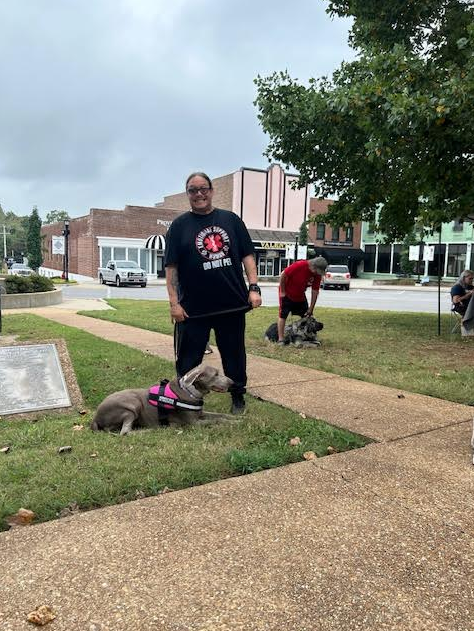Unlocking the Life-Changing Benefits of Service Dogs for Veterans
- Sep 1, 2025
- 3 min read
Veterans often face unique challenges after their service, including physical disabilities, post-traumatic stress disorder (PTSD), and social reintegration difficulties. Service dogs for veterans have emerged as a powerful support system, offering companionship, assistance, and emotional healing. These specially trained dogs provide more than just aid - they transform lives.
How Service Dogs for Veterans Make a Difference
Service dogs are trained to perform specific tasks that help veterans manage their disabilities and improve their quality of life. For example, a service dog can:
Provide mobility assistance by helping veterans with balance or retrieving dropped items.
Alert to medical conditions such as seizures or changes in blood sugar.
Interrupt anxiety or panic attacks by providing tactile stimulation or grounding.
Create a sense of safety in public spaces, reducing social isolation.
Encourage physical activity and outdoor engagement, which benefits mental health.
These dogs are more than pets; they are partners who help veterans regain independence and confidence. For instance, a veteran with PTSD might rely on their service dog to detect signs of distress and provide calming pressure, allowing them to navigate crowded places or sleep more peacefully.

The Process of Training and Matching Service Dogs for Veterans
Training a service dog for a veteran is a detailed and personalized process. It involves:
Assessment of the veteran’s needs - Understanding the specific challenges and lifestyle.
Selection of the right dog - Temperament, size, and skills are matched to the veteran.
Specialized training - Dogs learn tasks tailored to the veteran’s disabilities.
Team training - The veteran and dog train together to build trust and communication.
Ongoing support - Follow-up training and assistance ensure the partnership thrives.
Organizations dedicated to training service dogs for veterans often work closely with medical professionals and therapists to ensure the dog’s skills align with therapeutic goals. This collaboration maximizes the benefits for the veteran.
If you want to learn more about how these programs work or support them, consider exploring Working Dogs For Vets, a nonprofit that trains service dogs specifically for veterans.

What is the 3-3-3 Rule for Dogs?
The 3-3-3 rule is a helpful guideline for understanding how dogs, including service dogs, adjust to new environments or situations. It breaks down as follows:
3 minutes: The dog’s initial reaction to a new environment or stimulus.
3 hours: The time it takes for the dog to settle and feel comfortable.
3 days: The period needed for the dog to fully adjust to a new routine or home.
For veterans receiving a service dog, this rule can be a useful way to manage expectations during the early days of their partnership. Patience and consistency during this adjustment period help build a strong bond and effective teamwork.
Veterans and trainers can use the 3-3-3 rule to monitor the dog’s behavior and ensure any stress or anxiety is addressed promptly. This approach supports the well-being of both the dog and the veteran.

Psychological Benefits of Service Dogs for Veterans
The psychological benefits provided by service dogs is profound. Many veterans experience:
Reduced symptoms of PTSD such as nightmares, flashbacks, and hypervigilance.
Lower levels of anxiety and depression through companionship and routine.
Improved social interaction as dogs often act as social bridges.
Increased feelings of safety and security in public and private settings.
Service dogs offer unconditional love and non-judgmental presence, which can be a lifeline for veterans struggling with mental health. The daily responsibilities of caring for a dog also provide structure and purpose, which are critical for recovery.
Veterans often report that their service dogs help them feel more connected to the world and less isolated. This emotional bond can be a catalyst for healing and personal growth.
Practical Tips for Veterans Considering a Service Dog
If you are a veteran thinking about getting a service dog, here are some practical steps to consider:
Research reputable organizations that specialize in training service dogs for veterans.
Understand the commitment involved in caring for a service dog, including time, finances, and lifestyle adjustments.
Consult with healthcare providers to determine if a service dog is a suitable option for your needs.
Prepare your home and routine to accommodate the dog’s needs and training.
Engage in training and bonding activities to build a strong partnership.
Remember, a service dog is a long-term companion that requires patience and dedication. The rewards, however, are life-changing.
Service dogs for veterans are more than helpers - they are healers, protectors, and friends. Their impact reaches far beyond physical assistance, touching the emotional and psychological well-being of those who have served. By understanding the benefits and responsibilities, veterans can unlock a new chapter of independence and hope with their canine partners.




























Comments